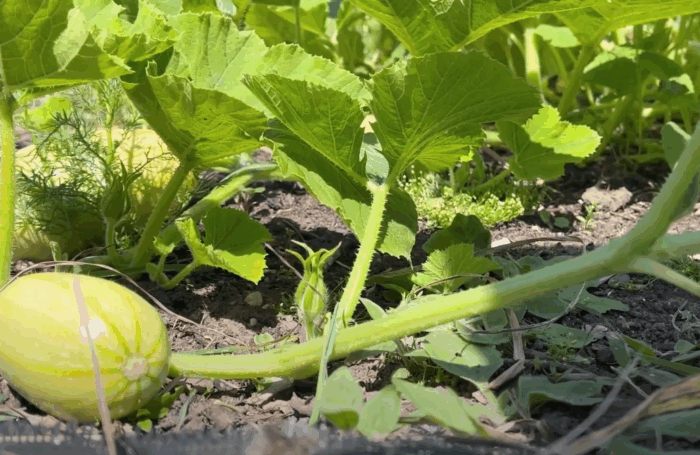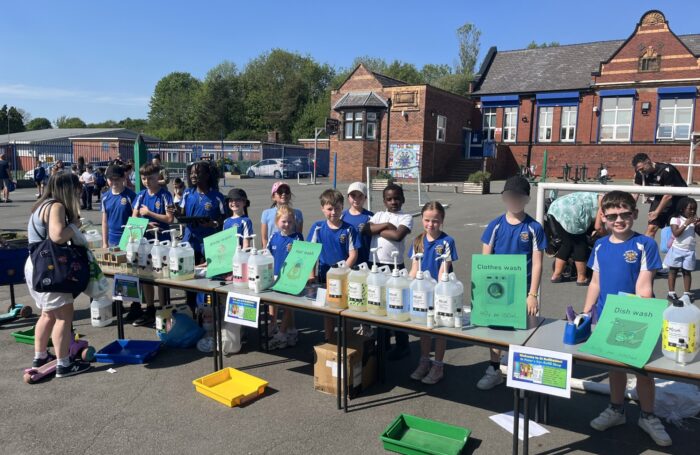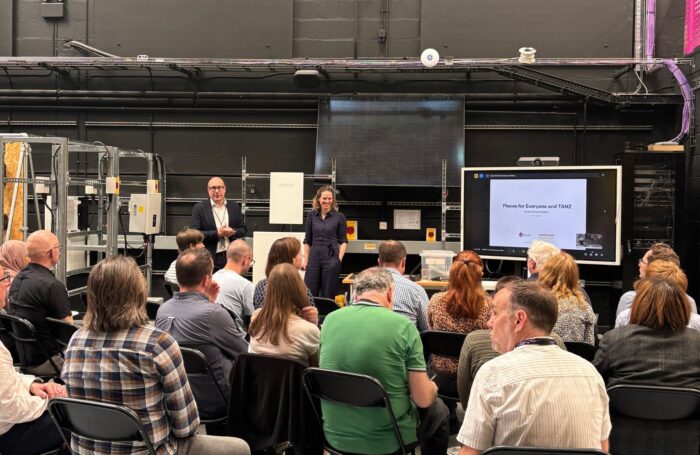Welcome to our look-back on the Greater Manchester Green City Region for 2022. Amidst the backdrop of global and national change and challenge, including the war in Ukraine and the cost-of-living crisis, Greater Manchester partners, businesses and residents nevertheless continued to deliver on the ambitions of the city-region’s Five Year Environment Plan.
Join us as we look back on 2022…
January
We started the year by launching the School Climate Action Planner. Funded by GMCA, environmental charity Global Action Plan developed a resource for all schools wanting more information on delivering a curriculum and education environment which inspires young people to reduce their climate impact.
February
After two years of development work, we launched the Greater Manchester ‘Go Neutral’ Framework, a trusted ‘route to market’ for public sector organisations to procure suppliers cost-effectively, helping them to decarbonise their buildings and estate with smart energy schemes.
We also hosted a visit from the Climate Change Committee, an independent, statutory body, who advise the UK and devolved governments on emissions targets and to report to Parliament on progress.
March
Learning from completed projects is how we improve and maximise effort for future programmes. Externally funded projects often ask for us to share best practice with partners and other regions – read more about what we have learnt this year from being a DEFRA Urban Pioneer and from the conclusion of the innovative IGNITION GM project.
Greater Manchester’s leaders declared a Biodiversity Emergency and agreed to sign the Edinburgh Declaration, a statement of intent which calls for local, national and international action to reverse biodiversity loss.
Belfast, Dublin, the Liverpool City Region and Greater Manchester announced a new partnership to cooperate on climate action and net zero innovation.
The GM Retrofit Taskforce – first launched in July 2021 – aims to accelerate energy efficient renovations on the region’s buildings through new finance solutions and increasing the supply and demand for the skills and jobs needed to grow the supply chain. Read more about how this pioneering programme progressed in the eight months since the launch.
April
The effects of the war in Ukraine were beginning to have an impact across the nation, with an unsustainable rise in energy prices. To help keep the heat on at home, we collated some advice and energy efficiency tips for residents.
GMCA was recognised at the Green Energy Awards for extraordinary contribution to the region’s energy transition.
The University of Salford, home of the Living Lab, hosted the final dissemination event for the IGNITION GM project. This featured learning from the three-year project, which was backed by €4.5 million from the EU’s Urban Innovation Actions initiative. The project compiled evidence, developed business cases and ran pilots to provide a robust case for how, why and where urban nature-based solutions can be done in Greater Manchester.

Surveys of invasive non-native species (INNS) of plant in the River Irwell catchment were launched to help us better understand their spread and impact on local biodiversity. A video designed to raise awareness of INNS and drive action was developed alongside the survey, launching later in the year at the Green Summit.
The Energy Innovation Agency launched their plans for the region. Over 100 innovators and stakeholders attended and were provided with the opportunity to pitch for support from the agency in a ‘Dragon’s Den’ themed format.
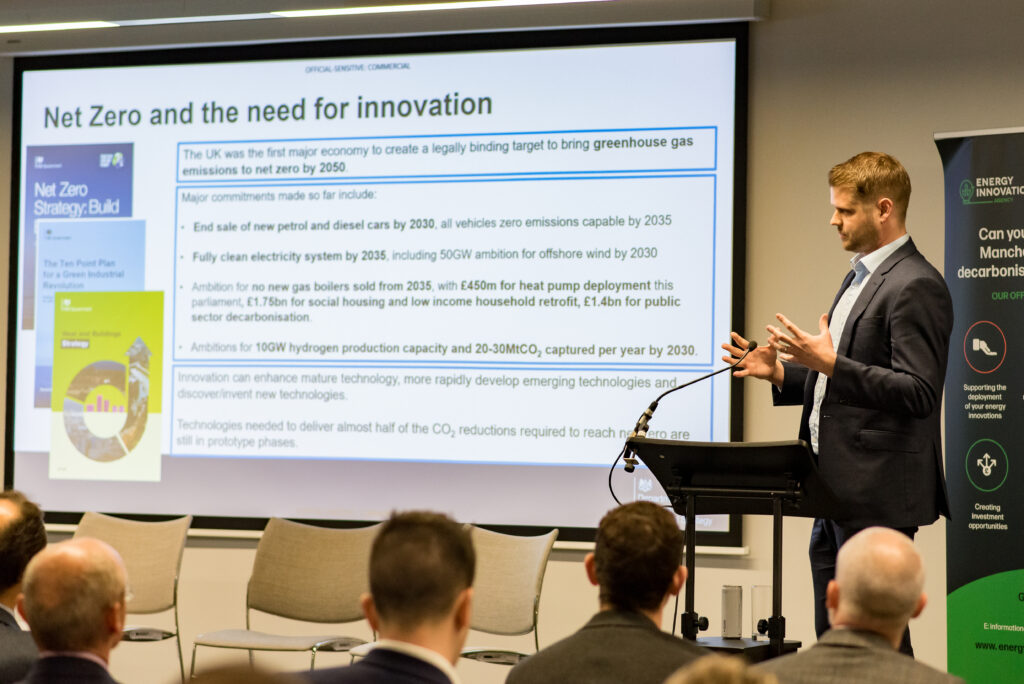
May
The new Greater Manchester Strategy was launched, setting out the route over the next decade to make a greener, fairer, more prosperous city-region. As part of this, the £2.6m Green Spaces Fund was announced to enhance or create new community green spaces. Through the Green Spaces Fund, small grants have been made available for community groups wanting to create new spaces or improve existing ones in their local area, from parklets and green streets to community gardens and growing spaces.
Round Two of the Recycle for Greater Manchester Community Fund was launched, following 21 local projects being funded in 2021. The fund is a joint R4GM and Suez initiative to support the Greater Manchester community and voluntary sector groups. See all the projects which were awarded funding from 2021 and now 2022.
We welcomed two funded PhD student from the University of Manchester to commence work as part of their studies on the next reiteration of the Five Year Environment Plan for Greater Manchester.
June
The Greater Manchester Sustainable Consumption and Production (SCP) Plan was approved. The collaborative plan highlights what is needed to move Greater Manchester to a model that is more reliant on circular economy principles, designing out waste, reusing and recycling materials, and how to empower residents to make more sustainable lifestyle choices.
Bee Net Zero held its first board meeting. Led by the Business Growth Hub, Bee Net Zero brings together networks, organisations and supports programmes from across Greater Manchester, making the transition straightforward and cost-efficient.
SSE hosted the first North West Decarbonisation Summit at the Manchester Science Museum, with many regional partners contributing to the agenda. The event hosted a soft launch of the ‘Your Home, Better’ service providing advice to residents on home energy efficiency.
E-learning training course on Climate Change launched for all GMCA/GMFRS staff. 487 staff members completed the training in the first week.
National Flood Risk Management Programme (2021-2027) got underway in underway in Greater Manchester with 61 projects and an anticipated spend of £142million. Outcome of 10,000 existing homes better protected from future flood risk.
July
We were proud to see three GMCA-funded delivery partners scoop awards in their categories at the 2022 North West Construction Awards. The first of the three regional projects saw Cara EPS, Greater Manchester Combined Authority, Procure Plus and IRT Surveys Ltd scoop the NW Regional construction award for Innovation for the Green Homes Grant Local Area Delivery project. Rochdale Borough Council with EQUANS – won the Value award for their Public Service Decarbonisation Scheme. Finally, University of Salford’s Energy House 2 won two awards: Manchester Sub Regional Award and NW project of the Year Award.
In a series of engagement events, citizens volunteered to provide their views on the Local Energy Market. Each local authority now has a local energy plan, with the intention of delivering a smarter local energy system that will revolutionise how energy is used, stored and distributed across Greater Manchester’s 10 boroughs. Read how the Carbon Coop held conversations with 282 people, in person, across 14 locations.
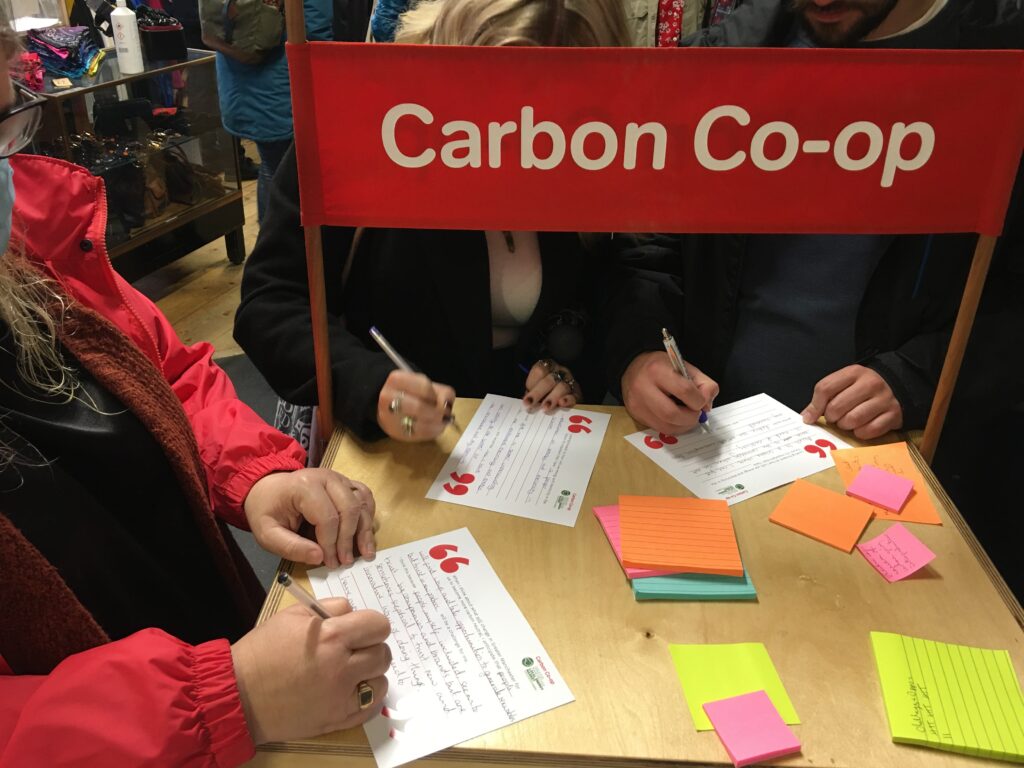
August
Your Home Better, a new independent service delivered by retrofit experts and backed by GMCA, was launched to provide advice to people across the region on how to upgrade their home in a greener and more affordable way. Read more.
September
After a successful Round One of applications to the Green Spaces Fund, the Greater Manchester Environment Fund launched Round Two for applications from community groups wanting to create new, accessible green spaces or improve existing ones in the areas where they are needed most
The Trafford Green Hydrogen project, potentially one of the largest to be built in the UK, had planning permissions approved. Read more on how this could be the catalyst for the creation of a hydrogen economy in the North West over the next decade.
The UK’s biggest and most unique reuse and repair facility, the Renew Hub, celebrated the renovation and reselling of more than 50,000 items in its first year – diverting over 500 tonnes of material from going to landfill. The Renew Hub, based at Trafford Park in Greater Manchester, has created 20 new jobs and has now launched its own non-profit online shop to sell antiques, furniture and collectables.

September also saw new lower bus fares rolled out across Greater Manchester. Adults will now pay no more than £2 for any single bus journey within the city-region, and children £1 – saving around 50% on some trips. Passengers are also able to make unlimited journeys across all bus operators for no more than £5 (adult) or £2.50 (child) a day.
Following approval at a meeting of the Greater Manchester Combined Authority on 30 September, the city region is the first in the country to produce and adopt Local Area Energy Plans (LAEPs). The plans, one for each of the ten Greater Manchester districts as well as an overall one for the city region, detail the current position and a roadmap towards a decarbonised future.
The Green Homes Grant (LAD) domestic retrofit programmes were completed with a final install position of over 900 properties.
As the lead partner, GMCA commenced the delivery of a £19m (including £9m match) project as part of the national Social Housing Decarbonisation Fund (Wave 1). The programme brings together 10 Registered Providers including Arms-Length Management Organisations (ALMOs) from across Greater Manchester to deliver retrofit and low carbon measures to 1286 social homes, by March 2023. Read more about the programme.
October
The fifth Greater Manchester Green Summit took place on Monday 18th October at The Lowry Theatre. The event looked at how we can further accelerate action to tackle the climate crisis. With over 1000 people walking through the Lowry’s doors, 1500+ online viewers, 70+ exhibitors and 70 speakers for 16 sessions, it was a packed, collaboration-fuelled agenda. Read more with our Green Summit 2022 review.
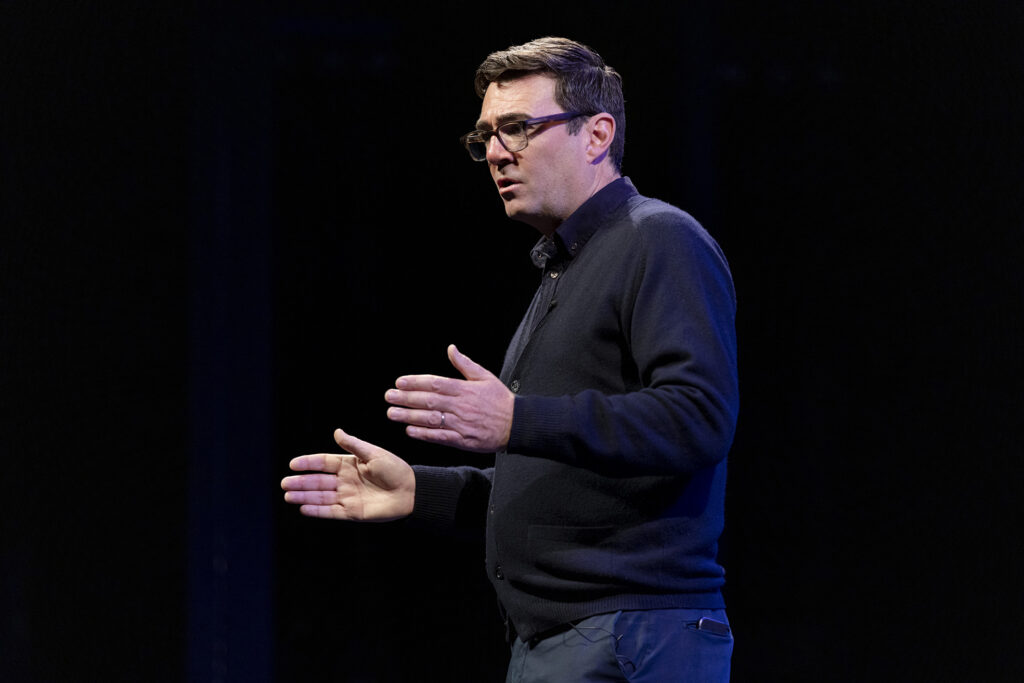
During the Green Summit, the Mayor also announced the 21 community projects across Greater Manchester boosted by the first wave of the Green Spaces Fund.
A vast new National Nature Reserve was created in recognition of the area’s natural beauty and immense ecological importance. The Flashes of Wigan and Leigh were formally declared by Natural England in partnership with Wigan Council, Lancashire Wildlife Trust and Forestry England to protect 738.21 hectares of precious wetland habitats.
Over 200 public sector buildings across Greater Manchester have seen their annual carbon emissions significantly reduced thanks to improvements making them greener and more energy efficient. Greater Manchester’s public buildings are now producing over 7,000 tonnes less CO2 equivalent per year, helping push the city-region towards its ambition of being carbon neutral by 2038 – 12 years ahead of the national target. The improvements are a result of over £78m from Government’s Public Sector Decarbonisation Scheme (PSDS), funded by the Department for Business, Energy and Industrial Strategy and delivered by Salix Finance.
A Memorandum of Understanding was signed between GMCA and the Green Finance Institute – establishing a portfolio of five innovative financial solutions in the region, that will offer homeowners and landlords access to attractive sources of private and blended capital to fund energy efficiency upgrades to their homes, including green mortgages, green rental agreements, local climate bonds and property linked finance.
ECO4 Flex Framework was approved. The Government scheme, worth £4 billion, delivers energy efficiency and heating measures to homes in Great Britain. The scheme will support households on the lowest incomes. Households in receipt of means tested benefits will be eligible. Only energy efficiency band D-G homes will be eligible for ECO4. For social housing and private rented accommodation, ECO4 will support the least efficient homes in bands E-G only.
November
For the second consecutive year, Greater Manchester was recognised as amongst 123 top global city-regions in tackling climate change. Designed to encourage and support cities to ramp up their climate action and ambition, the A List is based on environmental data disclosed by cities to the Carbon Disclosure Project (CDP), a global non-profit that runs the world’s environmental disclosure system for companies, cities, states and regions.
The Greater Manchester Truly Affordable Net Zero Homes (TANZ) Task Force – which brings together industry leaders, experts and stakeholders from across local authorities, housing providers, University of Salford, Greater Manchester LEP, developers, Northern Housing Consortium and Homes England amongst others to help deliver 30,000 net zero social rented homes in Greater Manchester by 2038 – met for the first time.
Looking ahead to 2023
The Green Skills Academy was officially launched on Monday 19th January. Find out more.
The newly formed Greater Manchester Sustainable Textiles and Fashion Group will explore and drive circular solutions for the region’s textile waste problem and help to create positive change. Read more.
BEIS is also set to announce further successful projects for the second wave of the national Social Housing Decarbonisation Funding in February 2023. A consortium of 12 housing providers led by Greater Manchester Combined Authority has applied for funding to make energy efficiency improvements to over 6000 social homes to the value of £97 million. The programme will address fuel poverty experienced by social housing tenants and support green economic growth.
A Solar Schools Guide will be launched, offering expert advice to progress solar installation and energy generation through the Go Neutral programme.
The final rounds of the Green Spaces Fund will support more residents and groups across the city-region, delivering more quality green spaces where they are needed most.
The Local Nature Recovery Strategies – of which Greater Manchester was a pilot in 2021 – will be rolled out and implemented more widely.
Finally, keep your eyes-peeled for a new Air Source Heat Pump offer from Octopus Energy supported by GMCA to help households in the region make the shift to new heating technology.
